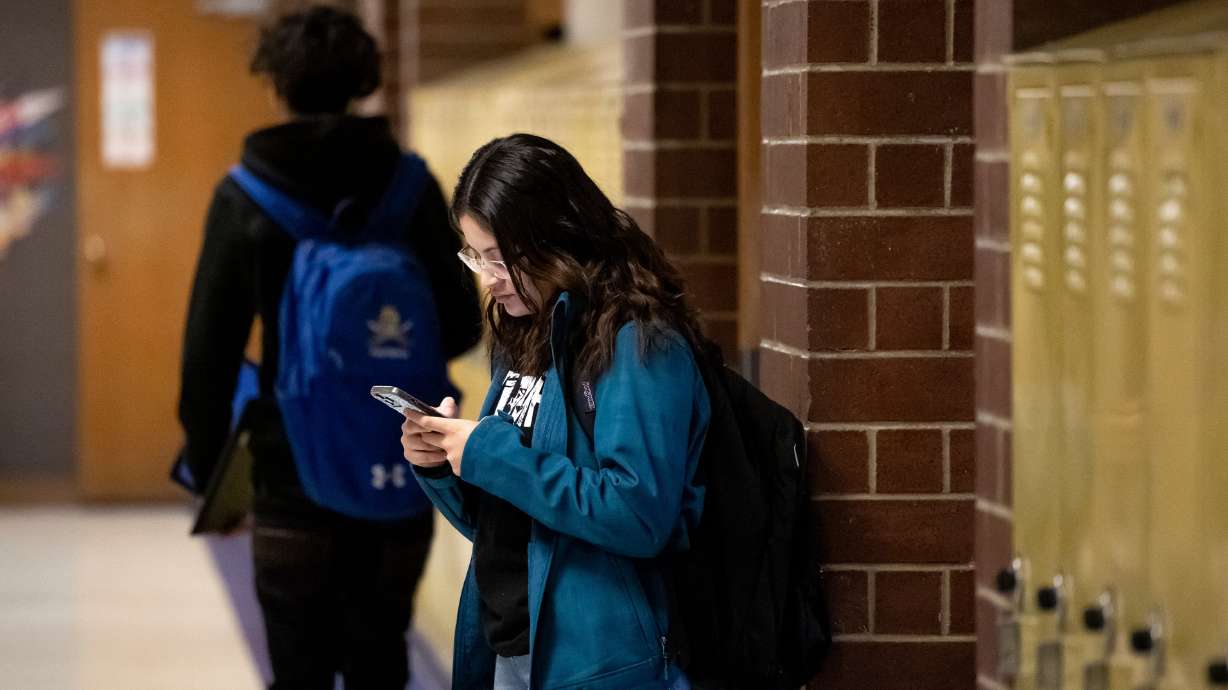Estimated read time: 4-5 minutes
- Lawmakers in Congress and other states are pushing for cellphone bans.
- A bipartisan Senate bill seeks research on cellphones' impact on education and mental health.
- The bill follows action in Utah to limit cellphone usage in the classroom.
WASHINGTON — As more states establish restrictions on cellphone usage in classrooms, some lawmakers are considering nationwide efforts to follow suit.
Utah is at the forefront of the growing issue, and both national and local Beehive State lawmakers support the focus on protecting students during learning hours.
Under legislation making its way through the U.S. Senate, a bipartisan group of lawmakers is pushing for increased research on the effects of mobile devices in elementary and secondary schools. The bill would require the surgeon general to complete such a study within two years detailing the impact of cellphone use on academic achievement, student engagement, mental health, social relationships and more.
"I'm glad to join my colleagues in introducing this bipartisan legislation to provide us with more information on cellphone use, so schools and parents can make the best decisions to set kids up for success," Sen. Tim Kaine, D-Va., the Democratic co-sponsor of the bill, said in a statement. "I'm also glad that our work on this issue has already generated interest at the state and local level around the nation."
The bill would also authorize $5 million annually to establish a pilot program over the next five years awarding grants to participating schools that "purchase secure containers and install lockers in order to create a school environment free of mobile devices." The program would be spearheaded by the Secretary of Education in consultation with the Secretary of Health and Human Services.
The bill carves out some exceptions for students with disabilities, devices needed to monitor or treat health conditions, or translation devices for students learning English as a second language.
The program would also require schools to establish a communication system for teachers, administrators and staff to communicate with local emergency responders.
At the end of the five years, the findings of the pilot program would be presented to Congress and a report must be made publicly available.
The bill has potential to gain increased support from other lawmakers.
Sen. John Curtis, R-Utah, for example, has been vocal in recent years about cracking down on the effects of online devices and social media on children.
"As a father and grandfather, I've witnessed firsthand how deeply the pressures and challenges of the digital age impact our children's mental health and well-being," Curtis told the Deseret News in a statement. "Limiting cellphone use in the classroom is a step in the right direction — helping young students stay focused, feel less anxious, and better connect with their learning. I'm encouraged to see momentum around this idea, and I support efforts that put kids first and create healthier, more focused learning environments."
Congress mirrors states implementing their own bans
The program proposal comes as a growing number of states consider or establish cellphone bans in schools, citing concerns about mental health and educational distractions.
The Utah Legislature passed a bill earlier this year banning mobile devices in school, which is set to take effect before the start of next school year.
The new law carves out some exceptions to allow students to use their phones outside of class, such as during lunch or other designated breaks. It doesn't go as far as other states such as Arkansas, which implemented a "bell to bell" ban, meaning cellphones are not permitted at any point during the school day.
Utah Gov. Spencer Cox praised the bill passed by Utah legislators, but said he wished the law went further — specifically citing the "bell to bell" legislation.
"All of the research is 100% clear that bell to bell does protect our kids so much more than going to recess and getting on your phones, going to lunch and immediately being back on your phones," Cox said when he signed the bill earlier this month. "So I hope we're not done here."
Most Utahns support limiting cellphone use during instructional time, according to a Deseret News/Hinckley Institute of Politics poll conducted last year. As many as 69% of Utahns said they supported the policy, while only 26% were opposed. Another 6% said they "don't know."
That sentiment is even shared by some high school students themselves. When approached by the Deseret News earlier this year, several high school students said they'd be fine with limited usage inside classrooms.
The U.S. Senate proposal was introduced earlier this year, although it's not yet clear when, or if, it'll be brought to the floor for a vote. Similar legislation was introduced in 2023 but never made it out of committee. Vice President JD Vance, who was the junior senator from Ohio at the time, had signed on to that version as a co-sponsor.










